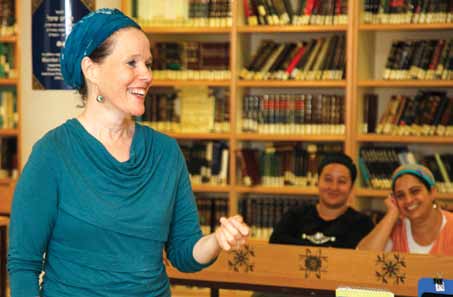Tag : behind the headlines
October 7, 2014 by admin
Teaching by Example, Even in Mourning Her Murdered Son
 When cataclysmic events thrust individuals into public roles, sometimes they exhibit tremendous courage and charisma, inspiring others. Rachel Fraenkel became such a person when her son Naftali was one of three teenage boys who in June were kidnapped on the West Bank and murdered on their way home for Shabbat. Even before the discovery of the bodies of Naftali Fraenkel, 16, Gilad Sha’ar, 16, and Eyal Yiftach, 19, while the public still believed they might be found alive, Fraenkel was the public face for the boys’ families and their spokesperson to the English-speaking world, giving interviews to journalists and speaking at the U.N. in Geneva.
When cataclysmic events thrust individuals into public roles, sometimes they exhibit tremendous courage and charisma, inspiring others. Rachel Fraenkel became such a person when her son Naftali was one of three teenage boys who in June were kidnapped on the West Bank and murdered on their way home for Shabbat. Even before the discovery of the bodies of Naftali Fraenkel, 16, Gilad Sha’ar, 16, and Eyal Yiftach, 19, while the public still believed they might be found alive, Fraenkel was the public face for the boys’ families and their spokesperson to the English-speaking world, giving interviews to journalists and speaking at the U.N. in Geneva.
Fraenkel has spent her entire career at institutions of higher Jewish learning for women. She is on the faculty at two Israeli institutions, Nishmat and Matan, both dedicated to teaching women Jewish texts and promoting them as sources of religious leadership. Matan, founded by Rabbanit Malka Bina, has the first women’s daf yomi siyum, the seven year cycle of studying a page of the Talmud each day. (Disclosure: I studied at Matan in the summer program for Americans in 1995 and 2006.) Nishmat was created to give American women without a background in Jewish learning a chance to access it, and now has programs for Israelis, Ethiopian-Israelis and American-Israelis, including a program to allow women to become yo’atzot halacha, advisors on Jewish law, certifying their expertise to answer certain types of questions. (Disclosure: my daughter was a post-high school student there this year.)
Nechama Barash, who met Fraenkel in the Yoatzot program at Nishmat and is currently a student at the Advanced Halacha Program at Matan, said of her teacher and colleague that “Her articulateness and her ability to connect to am yisrael (the people of Israel) has been sharpened by her years of teaching, lecturing, answering sensitive questions on the Nishmat hotline and talking to rabbinic authorities.”
One can imagine that the religious and spiritual resources Fraenkel acquired from her training served her well under the hideous circumstances she confronted, by happenstance also making her the best case to argue for why women should study Torah.
In a video clip, made after a public call for prayer at the Western Wall in Jerusalem, Fraenkel said she wanted children praying for the safe return of her son and the two young men hitchhiking with him, to know that their prayers were “not in vain even if they don’t get the hoped-for results.” Throughout the weeks-long ordeal of not knowing the fate of her son, she was able to maintain her focus on being positive, on having faith, on trying to bring good into the world.
At her son’s funeral, Fraenkel said, “Prayer is worthy, both before one’s fate is decreed and after.” But, she added, “You can not always change a decree. For us it was too late.” She continued, “The act of prayer is worthy, no matter what the outcome,” because “each prayer has its own work to do. There is no senseless act of love and charity. A good act stands on its own.”
When she recited the kaddish for her son at his funeral, the chief rabbis present, in an action unusual for them, responded “amen” out of respect for her loss and in recognition of the authenticity of her prayer. It is uncommon for Israel’s chief rabbis to acknowledge a woman’s public voice in prayer this way.
When Mohammed Abu Khedair, an Arab teenager, was killed by angry Israelis in revenge for the three Jewish teenagers’ killings, Rachel Fraenkel went to pay a condolence call to the Khedair family, modeling compassion.
Where did this strength and confidence come from? Even in the face of her personal tragedy, Fraenkel asks others to hope for a better world. “I just want to turn to Palestinian parents and say maybe you can stop Hamas from using you as human shields and your death as propaganda.”
“I promise the Palestinian parents: All we want is to live in peace and raise our children without threats of missiles or tunnels under our communities,” she added. “Maybe we can teach our children that we want to live in peace.”
- No Comments
 Please wait...
Please wait...